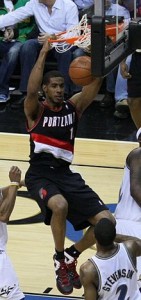Raise your hand if you had the Portland Trail Blazers leading the Western Conference. 
OK, now put your hand down and stop lying.
The Trail Blazers are 16-3. After a disappointing loss in Phoenix that ended a double-digit winning streak, Portland is 3-0 in December, including back-to-back home victories over the Indiana Pacers and the Oklahoma City Thunder, two of the best teams in the NBA.
There are two things every NBA fan wants to know right now. First, is this Blazers team for real? And second, how are they doing what they’re doing?
The answer to the first question is yes, this Blazers team is definitely for real. Does for real mean they will win 50 games or make the Western Conference finals? It’s too early to tell. But it does mean that their record is no fluke.
As for how the Blazers are doing what they’re doing, there are plenty of reasons. Here are just a few:
1. This team is having fun. Most teams that win would say that they are having fun, and they wouldn’t be lying. That shouldn’t take away from the fact that this Portland team seems to be really enjoying what’s happening right now. Aside from the simple fact that winning is fun, these Blazers are likely having so much fun right now because of how little fun they had at the end of last season.
Remember, this is a team that closed 2012-13 by losing 13 games in a row. Playing in the NBA is a great job, but when your team goes a month without a win, I’m sure it feels more like an obligation than a privilege. Through November and now into December, these Blazers have legitimately enjoyed suiting up and coming to work each day. If they keep doing that, they will probably keep winning.
2. Everybody is buying in. The Blazers play an inclusive team-oriented style. Yes, LaMarcus Aldridge and Damian Lillard are the stars (more on that later), but this is a team without egos requiring massaging or controlling. Through the rotation, each player has taken to heart the program developed by Terry Stotts and his coaching staff. Not a single guy on Portland’s roster is playing as if he is more important than the team as a whole.
But it’s more than just swallowing egos. These Blazers are taking responsibility for their individual roles, whatever they may be. Whether it’s Dorell Wright chasing down a play just to contest a layup Nicolas Batum going off book on a play drawn up for Aldridge because he knows he’s open and expected to make open shots, every Blazer on this team is ready to step up and do his part.
3. The Blazers have taken advantage of their situations. Call it an easy schedule if you want. Say they beat Chicago only after Derrick Rose had to leave the game. Point out that Oklahoma City was on the second night of a back-to-back and that San Antonio had the bad luck of being Portland’s home opener. Regardless of the disclaimers, the Blazers still had to win all those games.
If the Blazers had dropped one or two of their easier road games (Sacramento, Boston, Milwaukee) or hadn’t exploited the unexpectedly shorthanded Bulls, people would be talking about missed opportunities. That being true,  it’s fair game to say the Blazers are where they are right now because they took advantage when the advantage was there for the taking.
it’s fair game to say the Blazers are where they are right now because they took advantage when the advantage was there for the taking.
4. Terry Stotts has figured out his rotations, which have been great. A lack of depth killed the Blazers last season. But improved depth is what is making these Blazers special. At the backcourt positions alone, Stotts has enough talent to fill gaps and create matchup problems for any opponent.
Lillard and Wesley Matthews start at guard, but add Mo Williams, and Lillard becomes a spot-up shooter and Wesley turns into a slasher. Leave Williams and Lillard on the floor but swap out Matthews for Dorell Wright, and the lane opens for either ballhandler. Toss Batum into the mix, and you could have a lineup with four shooters on the floor, leaving no possible way a defense could double-team LaMarcus Aldridge and not pay for it.
RELATED: How Mike Acker saw Portland’s season playing out
All these rotations and combinations are because of Stotts, whose offensive schemes played a big role in the 2011 title run by the Dallas Mavericks. The Western Conference Coach of the Month knows his personnel. He knows whom to put where and when to do it. That has translated to a lot of wins.